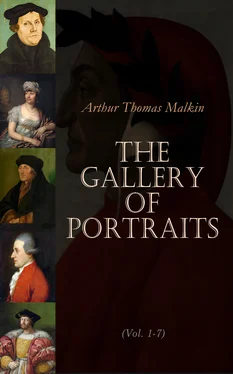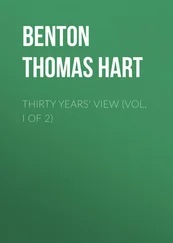He had, indeed, about this time some domestic afflictions, which reminded him of the frail tenure on which all human blessings were held, and the necessity that he should now begin to concentrate his mind upon the great works which he meditated. In 1651 his first wife died, after she had given him three daughters. In that year he had already lost the use of one eye, and was warned by the physicians that if he persisted in his task of replying to Salmasius, he would probably lose the other. The warning was soon accomplished, according to the common account, in 1654; but upon collating his letter to Philaras the Athenian, with his own pathetic statement in the Defensio Secunda, we are disposed to date it from 1652. In 1655 he resigned his office of secretary, in which he had latterly been obliged to use an assistant.
Some time before this period, he had married his second wife, Catherine Woodcock, to whom it is supposed that he was very tenderly attached. In 1657 she died in child-birth, together with her child, an event which he has recorded in a very beautiful sonnet. This loss, added to his blindness, must have made his home, for some years, desolate and comfortless. Distress, indeed, was now gathering rapidly upon him. The death of Cromwell in the following year, and the imbecile character of his eldest son, held out an invitation to the aspiring intriguers of the day, which they were not slow to improve. It soon became too evident to Milton’s discernment, that all things were hurrying forward to restoration of the ejected family. Sensible of the risk, therefore, and without much hope, but obeying the summons of his conscience, he wrote a short tract on the ready and easy way to establish a free commonwealth, concluding with these noble words, “Thus much I should perhaps have said, though I were sure I should have spoken only to trees and stones, and had none to cry to, but with the Prophet, Oh earth! earth! earth! to tell the very soil itself what her perverse inhabitants are deaf to. Nay, though what I have spoken should happen [which Thou suffer not, who didst create free, nor Thou next, who didst redeem us from being servants of men] to be the last words of our expiring liberty.” A slighter pamphlet on the same subject, ‘Brief Notes’ upon a sermon by one Dr. Griffiths, must be supposed to be written rather with a religious purpose of correcting a false application of sacred texts, than with any great expectation of benefiting his party. Dr. Johnson, with unseemly violence, says, that he kicked when he could strike no longer: more justly it might be said that he held up a solitary hand of protestation on behalf of that cause now in its expiring struggles, which he had maintained when prosperous; and that he continued to the last one uniform language, though he now believed resistance to be hopeless, and knew it to be full of peril.
That peril was soon realised. In the spring of 1660, the Restoration was accomplished amidst the tumultuous rejoicings of the people. It was certain that the vengeance of government would lose no time in marking its victims; for some of them in anticipation had already fled. Milton wisely withdrew from the first fury of the persecution, which now descended on his party. He secreted himself in London, and when he returned into the public eye in the winter, found himself no farther punished, than by a general disqualification for the public service, and the disgrace of a public burning inflicted on his Eikonoclastes, and his Defensio pro Populo Anglicano.
Apparently it was not long after this time that he married his third wife, Elizabeth Minshul, a lady of good family in Cheshire. In what year he began the composition of his ‘Paradise Lost,’ is not certainly known: some have supposed in 1658. There is better ground for fixing the period of its close. During the plague of 1665 he retired to Chalfont, and at that time Elwood the quaker read the poem in a finished state. The general interruption of business in London occasioned by the plague, and prolonged by the great fire in 1666, explain why the publication was delayed for nearly two years. The contract with the publisher is dated April 26, 1667, and in the course of that year the Paradise Lost was published. Originally it was printed in ten books: in the second, and subsequent editions, the seventh and tenth books were each divided into two. Milton received only five pounds in the first instance on the publication of the book. His farther profits were regulated by the sale of the three first editions. Each was to consist of fifteen hundred copies, and on the second and third respectively reaching a sale of thirteen hundred, he was to receive a farther sum of five pounds for each; making a total of fifteen pounds. The receipt for the second sum of five pounds is dated April 26, 1669.
In 1670 Milton published his History of Britain, from the fabulous period to the Norman conquest. And in the same year he published in one volume Paradise Regained and Samson Agonistes. The Paradise Regained, it has been currently asserted that Milton preferred to Paradise Lost. This is not true; but he may have been justly offended by the false principles on which some of his friends maintained a reasonable opinion. The Paradise Regained is inferior by the necessity of its subject and design. In the Paradise Lost Milton had a field properly adapted to a poet’s purposes: a few hints in Scripture were expanded. Nothing was altered, nothing absolutely added: but that, which was told in the Scriptures in sum, or in its last results, was developed into its whole succession of parts. Thus, for instance, “There was war in Heaven,” furnished the matter for a whole book. Now for the latter poem, which part of our Saviour’s life was it best to select as that in which Paradise was Regained? He might have taken the Crucifixion, and here he had a much wider field than in the Temptation; but then he was subject to this dilemma. If he modified, or in any way altered, the full details of the four Evangelists, he shocked the religious sense of all Christians; yet, the purposes of a poet would often require that he should so modify them. With a fine sense of this difficulty, he chose the narrow basis of the Temptation in the Wilderness, because there the whole had been wrapt up in Scripture in a few brief abstractions. Thus, “He showed him all the kingdoms of the earth,” is expanded, without offence to the nicest religious scruple, into that matchless succession of pictures, which bring before us the learned glories of Athens, Rome in her civil grandeur, and the barbaric splendour of Parthia. The actors being only two, the action of Paradise Regained is unavoidably limited. But in respect of composition, it is perhaps more elaborately finished than Paradise Lost.
In 1672 he published in Latin, a new scheme of Logic, on the method of Ramus, in which Dr. Johnson suspects him to have meditated the very eccentric crime of rebellion against the universities. Be that as it may, this little book is in one view not without interest: all scholastic systems of logic confound logic and metaphysics; and some of Milton’s metaphysical doctrines, as the present Bishop of Winchester has noticed, have a reference to the doctrines brought forward in his posthumous Theology. The history of the last-named work is remarkable. That such a treatise had existed, was well known, but it had disappeared, and was supposed to be irrecoverably lost. But in the year 1823, a Latin manuscript was discovered in the State-Paper Office, under circumstances which left little doubt of its being the identical work which Milton was known to have composed; and this belief was corroborated by internal evidence. By the King’s command, it was edited by Mr. Sumner, the present Bishop of Winchester, and separately published in a translation. The title is ‘De Doctrina Christiana, libri duo posthumi’—A Treatise on Christian Doctrine, compiled from the Holy Scriptures alone. In elegance of style, and sublimity of occasional passages, it is decidedly inferior to other of his prose works. As a system of theology, probably no denomination of Christians would be inclined to bestow other than a very sparing praise upon it. Still it is well worth the notice of those students, who are qualified to weigh the opinions, and profit by the errors of such a writer, as being composed with Milton’s usual originality of thought and inquiry, and as being remarkable for the boldness with which he follows up his arguments to their legitimate conclusion, however startling those conclusions may be.
Читать дальше












